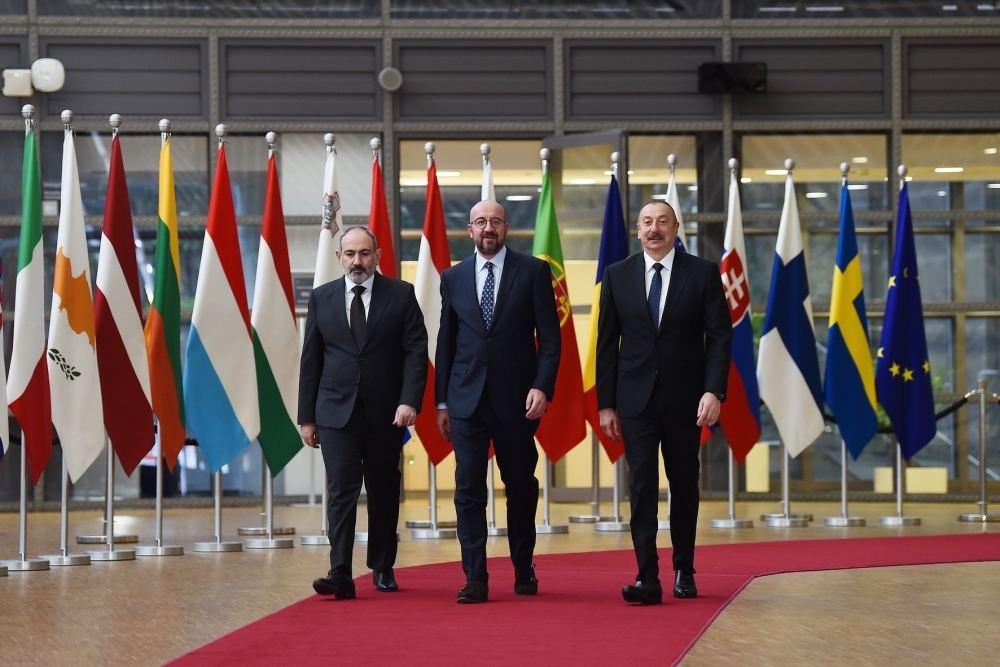Five+Six? Armenia presumes too much

By Orkhan Amashov
On the eve of what appears to be a hastily arranged meeting between Azerbaijani President Ilham Aliyev and Armenian Prime Minister Nikol Pashinyan, scheduled to take place under the auspices of the EU on 22 May, the need for progress is even greater, yet the chances of tangible achievement can only be contemplated with some caution.
From the ongoing demonstrations engulfing Yerevan to the spillovers of the Ukrainian crisis in the South Caucasus, numerous factors form the current backdrop against which negotiations will be conducted.
Armenia's "six-point package", long shrouded in obscurity, only revealed to the public a week ago, stands as a testament to Yerevan's obduracy to overcome the pressure of the peace-resistant section of the society and is clearly indicative that the old habits of the presently vanquished are yet to be dispelled.
Armen Grigoryan, Secretary of the Armenian Security Council, opined that the two offers, the original being made by Baku and the one recently placed in the public domain by Yerevan, should be integrated and form the backbone of a future peace deal. Given the futility of such a summation, the chances of talks progressing within the framework thereby offered are virtually non-existent.
It is true that Pashinyan is currently under pressure, and it is vital that the import of this is neither underestimated nor overestimated. When it comes to internal disquiet and the ongoing demonstrations, they are not yet sufficiently overwhelming to oust the incumbent government, but sufficiently consequential to derail the peace process.
There is a view in some analytical quarters of Armenia that Yerevan is currently pressured both by the West and Russia to sign a peace treaty with Azerbaijan. The pro-opposition Hraparak daily has recently published an article in which it was expounded that a comprehensive deal signed, under the pressure of either centres of power, will mean "the loss of Karabakh for Armenia''. The newspaper suggests that, if Yerevan succumbs to the West, the rights and security of Karabakh Armenians could be better protected once Russia is removed from this geography.
This is going to be the third EU-mediated trilateral meeting. The previous two were successful. In fact, the latter, on 6 April, marked the inception of a qualitatively new phase. The bilateral format was borne out of this and foundations were laid to commence negotiations around a peace treaty.
Yet, it is with regret that one has to acknowledge that the momentum it engendered has been insufficiently entrenched. As President Ilham Aliyev noted recently, the border commissions were supposed to meet on 29 April and 16-19 May, but nothing eventuated on either occasion, due to the last-minute change of mind from the Armenian side.
Armenian Foreign Minister Ararat Mirzoyan stated that Azerbaijan did not accept the offer to discuss the future status and security of Nagorno-Karabakh included in Armenia's "six-point" plan, and that was the reason for their refusal to convene the last meeting.
In the meantime, on 19 May, the U.S. Ambassador to Armenia, Lynn Tracy, in an interview to “Armenpress”, in a manner in want of diplomatic subtlety and discretion, reiterated some of the archaic constructs that were once pertinent to the now former conflict. Albeit not being of ultimately critical importance, her words did not go unnoticed in Baku.
"The shifting sands in Ukraine makes statesmanship much more problematic for all concerned than was the case after the trilateral agreement," Dr. Patrick Walsh, an Irish historian, told me whilst evaluating the import of the recent unrest in Armenia in the context of the West-Russia confrontation. One can only concur. Both Baku and Yerevan want to ensure that their stance regarding the war in Ukraine is consummate with their exigencies of the post-2020 South Caucasus.
At present, the circumstances are of such a nature that only a jaundiced glance could be thrown at the forthcoming Aliyev-Pashinyan meeting. Prior to the 6 April summit, the overall feeling was one of cautious optimism, which was later justified. Now even a greater reserve seems to guide one's thinking. Yet, as the immutable truth of all time suggests, one cannot rule out anything and realpolitik reigns supreme.
---
Follow us on Twitter @AzerNewsAz
Here we are to serve you with news right now. It does not cost much, but worth your attention.
Choose to support open, independent, quality journalism and subscribe on a monthly basis.
By subscribing to our online newspaper, you can have full digital access to all news, analysis, and much more.
You can also follow AzerNEWS on Twitter @AzerNewsAz or Facebook @AzerNewsNewspaper
Thank you!
